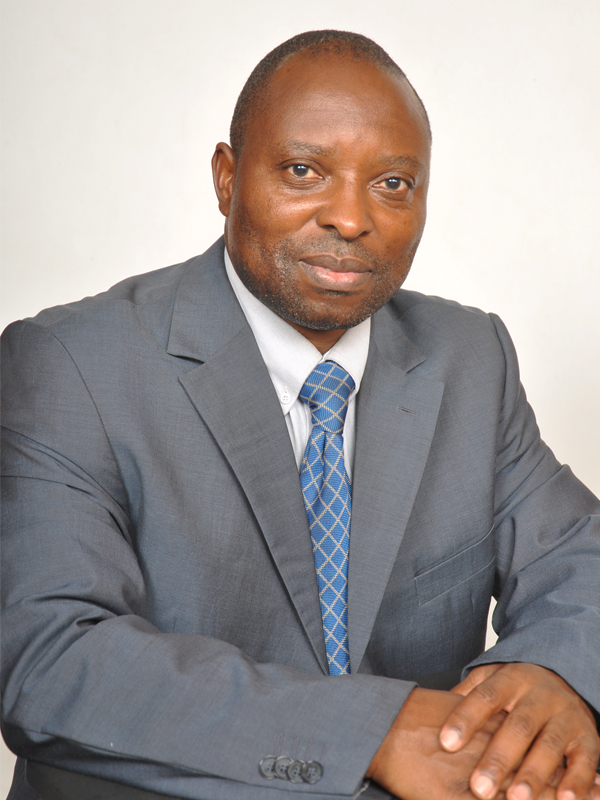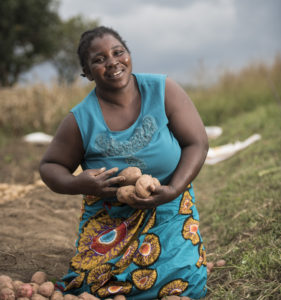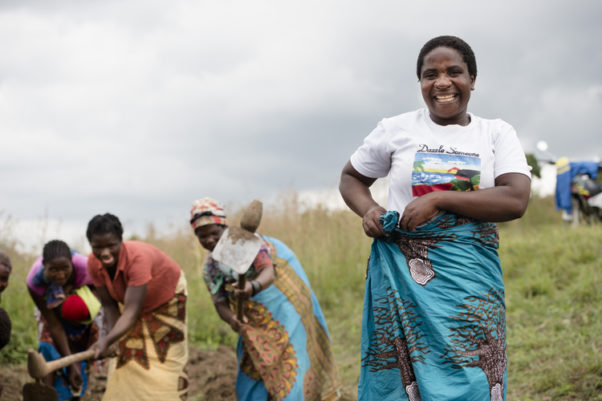 At the latest symposium for the International Society for Tropical Root Crops – Africa Branch (ISTRC-AB), the International Potato Center’s Regional Director for Africa, Paul Demo, was honored for his contributions to this work over the past 18 years.
At the latest symposium for the International Society for Tropical Root Crops – Africa Branch (ISTRC-AB), the International Potato Center’s Regional Director for Africa, Paul Demo, was honored for his contributions to this work over the past 18 years.
After the event, Demo sat down with Vivian Atakos, CIP’s Regional Communication Specialist for Africa, to discuss his work, the award and what he sees as the future of root and tuber research.
Q (Atakos): Congratulations on your very well-deserved award and recognition by ISTRC-AB. What does this award mean to you?
Demo: The award I received from ISTRC-AB was an excellent surprise to me. The executive committee of the organization awarded me for my contribution towards the promotion of root and tuber crops (RTC) in Africa. It reminded me of when I got my Bachelor of Science and started working on potatoes.
When you are working, you don’t know that people are observing and taking note of what you are doing. I did my BSC research in a CIP-funded project in collaboration with the government of Cameroon’s Institute of Agricultural Research in the potato program. CIP is therefore part of this recognition; it is a celebration moment for me and my colleagues, partners and everybody who was with me.
Q: Tell us about your journey into agricultural research. Where did all this begin? Why RTCs?
Demo: My journey on RTCs started with potatoes. It was a vision as a student at the University of Dschang in Cameroon pursuing an undergraduate degree as an engineer in Agricultural Production. I planned to become a commercial farmer and selected potatoes based on a feasibility analysis. I thought potato farming could be very good for a young person who wanted to start a farming business.
I have been very consistent and committed for 31 years, devoted to RTC research and development. I have been working with people in national programs in Africa, and with international organizations, farmers and the private sector.
Q: When did CIP become part of your research journey?
Demo: CIP was there all along this journey from my undergraduate years through my PhD. I joined CIP on an official work capacity as regional potato expert for sub-Saharan Africa in the Nairobi office in 2003, a position initially intended for only three years.
Those initial three years with CIP have now become 18 years. After that first project, I moved to Malawi to represent CIP on a USAID Southern Africa-funded project involving Malawi, Mozambique, Zambia and Angola. Prior to this, I had never been to southern Africa.
It was a relatively very small project having a budget of $200,000 for four countries. The money helped us to work with partners, training them in potato and sweetpotatoes (with my colleague Maria Andrade managing the sweetpotato component). We collaborated with national programs to release new varieties in each of those countries. At the same time, we carried out subsector appraisal for potato and sweetpotato, documented the situation, and identified the real needs with stakeholders in each country. We used those findings to write proposals toward dedicated projects for each of those countries.
After 12 and a half years in Malawi when I became Regional Director for Africa, we had grown from about $50,000 a year to about $3 million a year in Malawi. Looking at all the countries that I have worked in, we have contributed to building capacity and empowering people to continue what we started in those countries. It is a joy to know that you can initiate, train people, develop capacity, pull out, and the system can continue without you.
We are now giving them technical assistance and trying to develop new projects and portfolios bringing more people on board. This brings me a lot of joy.
Q: Feeding nine billion people in 2050 sounds like an uphill task given the challenges we are facing now with climate change and now pandemics like Covid-19? What is CIP doing to prepare those we work with for this task?
Demo: RTCs are very important for solving or mitigating climate change issues. RTC’s are more resilient under a changing climate and harsh environments and during drought. RTCs like potatoes and sweetpotato mature early. This means that when the rain is not enough, you don’t have complete crop failure most of the time compared to other staple crops.

We must promote and inform people about the potential that RTCs have, not only in climate change and crisis situations but also for nutrition, food security and income. Some years back, we began advocating for the RTCs and tried to convince the Malawi government to provide some more facilities for the actors to develop the value chain. We asked the government their reason for promoting maize more than RTCs. The Malawian Minister of Finance at that time said the population embraced maize more than RTCs. He then challenged us to popularize RTCs if we wanted the government to provide more support to RTCs.
As we promote RTCs we must be careful to produce the right varieties for end users and the markets. That’s why we are talking of product profiles: trying to identify different segments of consumers, farmers and know what they exactly need and expect. When we have a good product, marketing and promotion becomes easier. We have done a lot, but we still have room to improve on what we are doing and increase the adoption and utilization.
Q: This year we are celebrating 50 years of CIP’s technologies transforming lives around the world. What are some of your key achievements over the 18 years in your work that you are most proud of?
Demo: Our portfolio today has grown exponentially. When I was finishing my BSc in 1989, the CIP training department in Peru organized a training workshop on seed potato production and germplasm management. I was selected to be part of that training. That was my first training on seed potato production techniques and germplasm management. Scientists from CIP at that time had already created a lot of training materials that were being used to train people in different countries.
Today, we have moved from a research station to doing more work with farmers and more scaling of technologies. I am happy that this has taken place during my time. I would not have been happy working only on research and publishing without taking the results to beneficiaries. I am happy that we are currently using a very good research for development model.
Q: Looking into the future, what can we expect from One CGIAR, especially for root and tuber crops and millions of households who depend on them?
Demo: There is the recognition on the importance of RTCs, not only by those countries we work in, but also by our funders. RTC’s have been recognized in the one CGIAR and there’s a dedicated set of activities targeting them.
From pooled funding, we then need to look across not only from the few initiatives where we have already earmarked and included the RTCs, but we should also promote them for farming systems diversification. We should be talking about farming systems that include both livestock and crops. We should not miss the opportunity because RTCs can play an important role in diversification for income, nutrition, food security, for job creation and developing capacity without forgetting gender and youth.
I have been contributing to advocacy efforts, where possible, for One CGIAR to create a deliberate space for human capacity building at regional and national levels. When we talk of capacity building, the first thing that comes to mind is youth. We must develop the capacity of young people to embrace RTCs and other crops and livestock. The future may not look good if we forget developing capacity for people who will take over from the generation that is leading now. If I was not trained by CIP as a youth, I would have not been here or accomplished what I have contributed.
Q: You worked in Malawi before your current role as the Regional Director for Africa. Under your leadership, the country thrived in bilateral funding for RTCs. What can we bring into One CGIAR and specifically for women?
Demo: There’s something significant regarding gender. When I started in Malawi, I just assumed that we would naturally have women in the training workshops because most farmers of RTCs are women. When training farmers groups, we assumed that there would be many women with men among them.
After one year, we analyzed data by gender and discovered that less than 30% of the participants were women yet most women farm sweetpotato and potato. I asked the extension workers who assisted in planning the training events, as well as some male farmers, to explain why the representation of women in training did not reflect what existed on the ground. I was shocked to hear men respond that they represented women.
I could not imagine such a mindset of keeping women home, yet they are the majority who work on farms. How could such women get knowledge from the trainings on how to prevent disease and manage crops for higher yields? It is a challenge for a man to be trained and properly train their women compared to when the women get firsthand information during the training.
Men after a training session would not be competent enough to effectively pass on training knowledge to the women at home. After some discussion, the men agreed to allow more women to attend the trainings.
Since then, the participation of women is around 50% for potato and more than 50% for sweetpotato activities in Malawi. We deliberately decided to make it a standard that a minimum of 50% of beneficiaries in our projects should be women.

Q: Tell us something, that you’re comfortable sharing, that no one knows about you.
Demo: I’m always very optimistic even in very difficult and uncertain circumstances such as now when we are transitioning into One CGIAR. I believe the transition and One CGIAR will be a success.
Q: Paul is a very optimistic person, and that optimism comes from your confidence that you can use the very technologies you’re promoting among farmers, if you leave the research field, to create jobs and opportunities for yourself and others.
Demo: Exactly!
